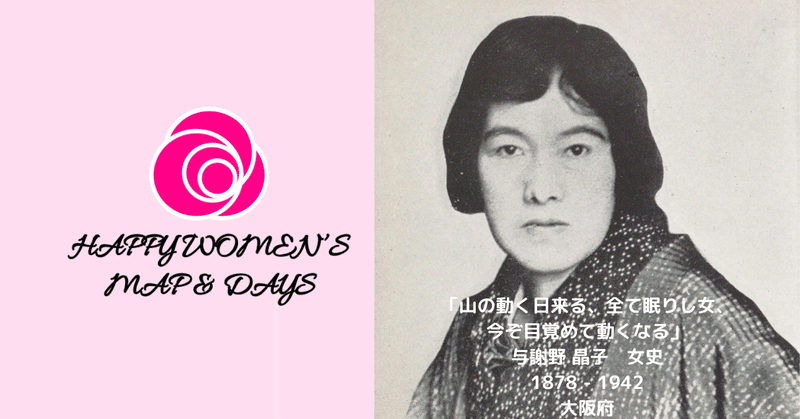
Happy Women's Map 大阪府 ロマン派女性歌人また母性保護論争の草分け 与謝野 晶子 女史

与謝野 晶子 女史
Ms. Akiko Yosano
1878 - 1942
大阪府堺市 生誕
Born in Sakai-city, Osaka-fu
「山の動く日来る、全て眠りし女、今ぞ目覚めて動くなる」
"The day of the moving mountain arrives, all sleeping woman, now awaken and move."
与謝野晶子女史はロマン派女性歌人の草分けです。歌集『みだれ髪』で若い恋愛・性愛をおおらかに歌って一世を風靡しました。評論家また日本初の女性童謡作家として活躍。母性保護論争の後、女性の完全な個人を目指して文化学院を創立しました。
Yosano Akiko was a pioneering female poet of the Romantic movement. In her poetry collection "Midaregami," she openly and generously sang about youthful love and passion, captivating a generation. She also excelled as a critic and became Japan's first female writer of children's songs. After the debates on maternal protection, she founded a cultural institute, aiming for women to pursue their complete individuality.
*******
晶子(本名 鳳志やう)は、堺県和泉国第一大区甲斐町(現在の大阪府堺市堺区甲斐町)で老舗和菓子屋「駿河屋」の8人兄弟姉妹の三女として生まれます。9歳から漢学・琴・三味線を学び、堺市立堺女学校(現・大阪府立泉陽高等学校)に入学。店番をしつつ和歌を投稿し始め、16歳のとき『文芸倶楽部』に短歌が掲載されます。ヨーロッパの影響で短歌革新運動が起こると、河井酔茗や河野鉄南たち主宰の浪華青年文学会(のち「関西青年文学会」)堺支会に入会。晶子は情熱的に思いを寄せていた僧侶・鉄南の勧めにより、与謝野鉄幹が創刊する『明星』に作品を投稿し始めます。誌面で晶子は山川登美子とともに「妙齢の閨秀作家」として、鉄幹の思わせぶりな返歌とともに紹介されるようになります。まもなく文学結社「東京新詩社」の参加者を募って鉄幹と山川登美子が来阪すると、晶子は鉄南と一緒に大阪北浜の平井旅館まで訪ねます。翌日の浜寺寿命館での歌会をきっかけに『明星』誌上で妻子ある鉄幹を巡る晶子と登美子の三角関係の恋歌が大変な話題となると、怪文書「文壇照魔鏡」で鉄幹の数々の女性関係が糾弾され、今とばかりに晶子は実家と縁を切って鉄幹を追って上京。2か月後には鉄幹プロデュースによる歌集『みだれ髪』で、24歳の晶子は鉄幹との情愛と情事をせきららに発表、ベストセラーとなります。翌年、晶子は鉄幹と結婚。夫・鉄幹はさらに結社の女性歌人たちとの恋歌のやりとりを誌上に掲載して話題を集めるなか、晶子は子育てに文筆活動に励みます。26歳の時に日露戦争下で『明星』に「君死に給うこと勿れ」発表するやいなや「乱心賊」と激しく糾弾されます。ロマン主義が廃れるとともに『明星』が廃刊する一方、晶子は33歳の時に『青鞜』発刊に「新しい女」の一人として参加、創刊号に「山の動く日」を寄せます。そんな中、夫・鉄幹をパリに遊学させるも寂しさのあまり鉄幹を追いかけますが、子供恋しさのあまりすぐに帰国。晶子はヨーロッパ見聞録とともに女性の権利・地位の向上を新聞・雑誌・講演などで訴えはじめます。41歳の時に『婦人公論』で「妊娠分娩等の時期にある婦人が国家に向って経済上の特殊な保護を要求」することを批判、平塚らいてう・山川菊栄・山田わからと母性保護論について激しい議論を繰り広げます。44歳の時に建築家の西村伊作はじめ山田耕作・北原白秋・石井拍亭・寺田虎彦・有島武郎・河崎なつ・芥川龍之介とともに東京の駿河台に女性を「完全な個人」に導く目的のもと「文化学院」を創設。夫と共に教壇に立ちながら、晶子は「新新訳源氏物語」に取り掛かります。関東大震災で学院とともに原稿を全焼するも、夫の突然の死に思い立ったかのように執筆を再会、闘病しながら60歳のときに刊行します。晩年は軍歌『爆弾三勇士』『皇軍凱旋歌』をつくる夫とともに日中戦争を支持、『紅顔の死』では中国の学生隊の躯を「やさしき母」「美くしき許嫁 」ある「敵の死屍」と憐れみ「善き隣なる日本をば侮るべしと教へし」「十九路軍の総司令の愚かさよ」と括っています。
Akiko (real name: Oshi Yau) was born as the third daughter of an established confectionery shop "Suruga-ya," part of the eight siblings, in Kai-cho, Izumi Province, Sakai, Osaka (now Kaimachi, Sakai Ward, Osaka City). She began studying Chinese classics, koto (a traditional Japanese instrument), and shamisen (a three-stringed instrument) at the age of 9. She later entered Sakai Girls' School (currently Osaka Prefectural Semboku High School). While assisting at the family shop, she started submitting waka poems. At the age of 16, her tanka (a traditional form of Japanese poetry) was published in "Bungei Kurabu" magazine. As the European influence led to a movement for innovation in tanka poetry, she joined the Sakai branch of the Naniwa Youth Literary Society (later renamed "Kansai Youth Literary Society") led by Koizumi Yakumo and Kono Tetsunan. Akiko, encouraged by her affection for the monk Tetsunan, started submitting poems in "Myojyo" magazine, which was founded by Yosano Tekkan. On the magazine's pages, Akiko and Yamakawa Tomiko were introduced as "accomplished young female authors," along with Tekkan's suggestive responses. Soon after, when Tekkan and Yamakawa Tomiko, both members of the literary society "Tokyo New Poetry Society," came to Osaka, Akiko and Tetsunan visited Hiraizumi Inn in Osaka Kitahama together. Following a poetry gathering at Hamadera Jumyo-kan the next day, the love triangle between Akiko, Tomiko, and the married Tekkan became a significant topic in "Myojyo" magazine. A scandalous document titled "Literary World Demonic Mirror" exposed Tekkan's various relationships with women. Akiko, in response, decided to cut ties with her family and pursued Tekkan to Tokyo. Two months later, her poetry collection "Midaregami" produced under Tekkan's guidance was published, where 24-year-old Akiko openly expressed her emotional love and romantic affair with Tekkan, turning it into a bestseller. The following year, Akiko married Tekkan. While Tekkan continued to publish poems exchanging affection with female poets from the society, Akiko focused on raising children and her literary endeavors. At the age of 26, her poem "Don't Lay Down Your Life" published in "Myojyo," under the backdrop of the Russo-Japanese War, led to harsh criticism. As Romanticism faded and "Myojyo" ceased publication, Akiko, at the age of 33, participated in the launch of "Seitou" magazine as one of the "New Women" and contributed the poem "The Day the Mountain Moves" in its inaugural issue. During this time, she sent her husband Tekkan to study in Paris, but her loneliness drove her to follow him. Overwhelmed by missing her children, she returned to Japan soon after. Akiko, along with her travel observations from Europe, began advocating for women's rights and status improvement through newspapers, magazines, and lectures. At the age of 41, she criticized "pregnant women demanding special economic protection from the state" in the magazine "Fujin Koron". This led to intense debates regarding maternal protection between herself and other prominent figures such as Hiratsuka Raicho, Yamakawa Kikuei, and Yamada Waka. At the age of 44, along with architects Nishimura Isaku, Yamada Kosaku, Kitahara Hakushu, Ishii Hakutei, Terada Torahiko, Arishima Takeo, Kawazaki Natsu, and Akutagawa Ryunosuke, she founded the "Bunka Gakuin" (Cultural Academy) in Surugadai, Tokyo, aiming to empower women as independent individuals. While standing alongside her husband in teaching, Akiko also started working on a new translation of "Brand New Translated Tale of Genji". Despite losing her manuscripts in the Kanto earthquake along with the academy, she resumed her writing, and at the age of 60, amid battling illness, she completed and published the work. In her later years, she, along with her husband who composed military songs like "Three Brave Bomber Pilots" and "Triumphant March of the Imperial Army," supported the Second Sino-Japanese War. In "Red Face", she sympathetically referred to the bodies of Chinese student troops as "enemies' corpses" having "gentle mothers" and "beautiful fiancées", and criticizing their 19th Route Army command for "disrespect for Japan as a kind neighbor" and calling "foolish".
-与謝野晶子記念館 Sakai Plaza of Akiko

Share Your Love and Happy Women's Story!
あなたを元気にする女性の逸話をお寄せください!
Share your story of a woman that inspires you!
この記事が気に入ったらサポートをしてみませんか?
